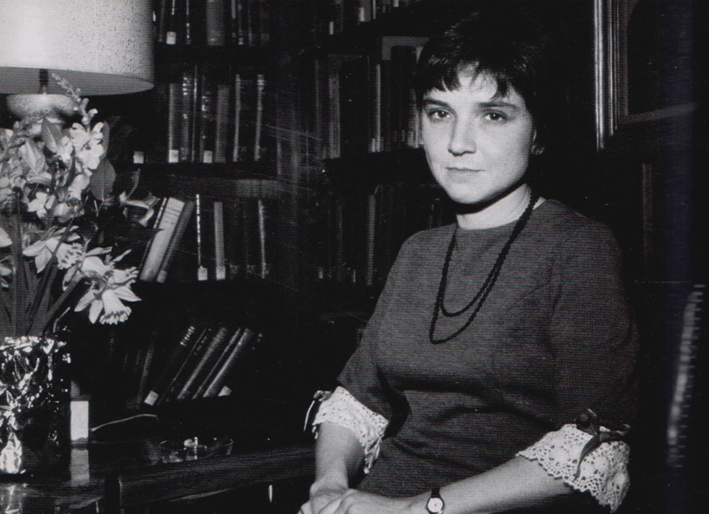One Art
BY PROF. VAROL AKMAN
Adrienne Rich (1929-2012)
Art means nothing if it simply decorates the dinner table of power which holds it hostage.
Having written more than two dozen volumes of verse and prose (her poetry alone has sold 800,000 copies), Adrienne Rich has since the sixties been considered among the leading writers of the American feminist movement. Being a woman, a lesbian and a Jew, she devoted a large part of her life to identity politics. In a 1984 speech, she described her literary ambitions succinctly: "the creation of a society without domination."
Rich was born in Baltimore on May 16, 1929. Her physician father was an authority on tuberculosis. Her mother was a pianist who gave up her career to raise children. Encouraged by her father to write poetry when she was still a child, Rich read all the poetry volumes in his library. (They were all written by men, she later remembered.)
Rich went to Radcliffe College, where she received her BA in English. W. H. Auden chose her first collection for publication in the Yale Younger Poets series and remarked in the preface: "The typical danger for poets in our age is, perhaps, the desire to be 'original'. Miss Rich, who is, I understand, 21 years old, displays a modesty not so common with that age, which disclaims any extraordinary vision, and a love for her medium, a determination to ensure that whatever she writes shall, at least, not be shoddily made." Published in 1951, the year of her graduation, "A Change of World" bears the unmistakable signs of the formalist background Rich gained when she was very young.
Her third collection, "Snapshots of a Daughter-in-Law," appeared in 1963, a defining moment in women's letters that also saw Betty Friedan's celebrated "The Feminine Mystique" describing the oppressive trivia that define women's lives as homemakers.
Rich came out as a lesbian in 1976, with the publication of "Twenty-One Love Poems." In a memorable piece (XIII) she wrote: "The rules break like a thermometer,/quicksilver spills across the charted systems/we're out in a country that has no language/... whatever we do together is pure invention/the maps they gave us were out of date/by years..."
Her honors include a MacArthur Foundation grant, the Bollingen Prize for Poetry, an Academy of American Poets Fellowship and the Ruth Lilly Poetry Prize. Rich received the National Book Award for poetry in 1974 for "Diving into the Wreck." Reviewing the book, Margaret Atwood observed: "It is not a manifesto, though it subsumes manifestoes; nor is it a proclamation, though it makes proclamations."
Among Rich's other volumes of poetry are "The Dream of a Common Language" (1978), "A Wild Patience Has Taken Me This Far" (1981), "The Fact of a Doorframe" (1984), "An Atlas of the Difficult World" (1991) and "Tonight No Poetry Will Serve" (2011). Her prose includes "Of Woman Born" (1976), "On Lies, Secrets, and Silence" (1979) and "Blood, Bread, and Poetry" (1986).
In 1997, Rich refused to accept the National Medal of Arts, the United States government's highest decoration presented to artists. In a letter to Jane Alexander, then chairperson of the National Endowment for the Arts, she cited as a reason her disappointment with "the increasingly brutal impact of racial and economic injustice in our country."
> Poetry is not a healing lotion, an emotional massage, a kind of linguistic aromatherapy. Neither is it a blueprint, nor an instruction manual, nor a billboard.
> Our ears, like it or not, take in so much in a day. Maybe some North American ears have trouble with poetry because of the noise from an aggressively voiced ruling ethos -- its terminology of war, success, national security, winning and losing, ownership, merchandising, canned information, canned laughter. Poetry can be direct, it can be colloquial, it can be abrupt or angry, but it's not that vacuous noise; it wants to unseat that kind of language, play other kinds of sound tracks.
> Poetry has the capacity to remind us of something we are forbidden to see. A forgotten future: a still uncreated site whose moral architecture is founded not on ownership and dispossession, the subjection of women, outcast and tribe, but on the continuous redefining of freedom -- that word now held under house arrest by the rhetoric of the 'free' market.
NOTES
The opening quote is from Rich's letter to Alexander. This week's poem was first published in The Nation in 1972. It also appears in "Diving into the Wreck," copyright © W. W. Norton & Company, Inc. The first quote is from an address Rich gave in 2006 to the National Book Foundation. The second is from a 2011 interview for The Paris Review. The third quote is from a 2006 commentary Rich wrote for The Guardian.
Translations
You show me the poems of some woman
my age, or younger
translated from your language
Certain words occur: enemy, oven, sorrow
enough to let me know
she's a woman of my time
obsessed
with Love, our subject:
we've trained it like ivy to our walls
baked it like bread in our ovens
worn it like lead on our ankles
watched it through binoculars as if
it were a helicopter
bringing food to our famine
or the satellite
of a hostile power
I begin to see that woman
doing things: stirring rice
ironing a skirt
typing a manuscript till dawn
trying to make a call
from a phonebooth
The phone rings endlessly
in a man's bedroom
she hears him telling someone else
Never mind. She'll get tired.
hears him telling her story to her sister
who becomes her enemy
and will in her own way
light her own way to sorrow
ignorant of the fact this way of grief
is shared, unnecessary
and political
